Snoring Caused by Sleep Apnea
Do you sometimes feel like you're tired all the time, even after a full-night's sleep? Or does your significant other say that you snore too much? You might be having sleep apnea, or the obstruction of the airways during sleep that decreases oxygen to the lungs which will cause patients stop breathing while they sleep, forcing them to wake up many times throughout the night. This happens because the brain senses that you are not breathing and forces you to wake up, just enough to start breathing again. Then they fall back asleep and the cycle begins again, and this can happen up to 100 times per hour. In severe cases, this can happen more than 120 times an hour, even though they may not remember when waking up. Sleep apnea is a potentially fatal condition that is treatable and it affects about 1 in 3 men and 1 in 6 women.
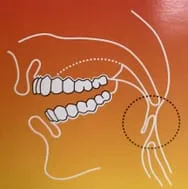
Relaxed and collapsed airway produces soft tissue vibrations during breathing, which results in snoring.
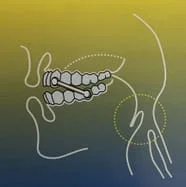
With a Silent Nite device (sleep apnea device), the airway remains open allowing easier breathing and snoring prevention.
Why do people snore? During sleep, the soft tissue in the mouth and throat relaxes, making the airway smaller. As the body inhales, air flows in and out through a constricted airway space, this soft tissues (like the soft palate in the uvula) vibrate, creating a snoring sound. In severe cases, the soft tissue and muscle obstruct the airflow completely, letting no oxygen through and causing an apneic episode which will signal to the brain to wake them up and gasp for air.
Symptoms of sleep apnea can include:
- Snoring
- Constant tiredness
- Poor concentration
- Forgetfulness
- Lack of energy
Short-term complications of sleep apnea are:
- Sleep deprivation
- Low energy
- Low attention span or cannot focus
- Negatively affects mood and relationships with others
- Risk of short-term memory loss
- Short-term cognitive impairment
Long-term complications of sleep apnea if untreated are associated with the conditions below:
- Hypertension
- Heart failure
- Diabetes
- Pre-disposed risk to early dementia and Alzheimer's
Roughly 80% of people with sleep apnea don't know that they have it.
Non-Surgical Sleep Apnea Treatment with a Dental Appliance
The goal of snoring prevention devices is to gently advance the lower jaw forward to enable the airway to open. In addition, lifestyle changes such as losing weight can help reduce soft tissue obstruction of the airway.
Silent Nite (mild snoring)
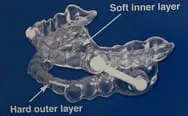
The custom design of the Silent Nite will insure comfort and effectiveness.
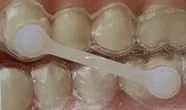
The special connectors position the jaw to keep the airway open and prevent snoring.
DTAP (moderate snoring)
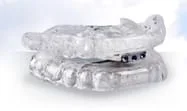
The DTAP application.
If non-surgical therapy does not work, we may recommend you to a specialist to further evaluate your condition. You may need the use of a breathing assistance device at night such as a CPAP (Continuous Positive Air Pressure) machine, which can be cumbersome. Before that, we will try conservative methods to try and relieve your sleep apnea.
